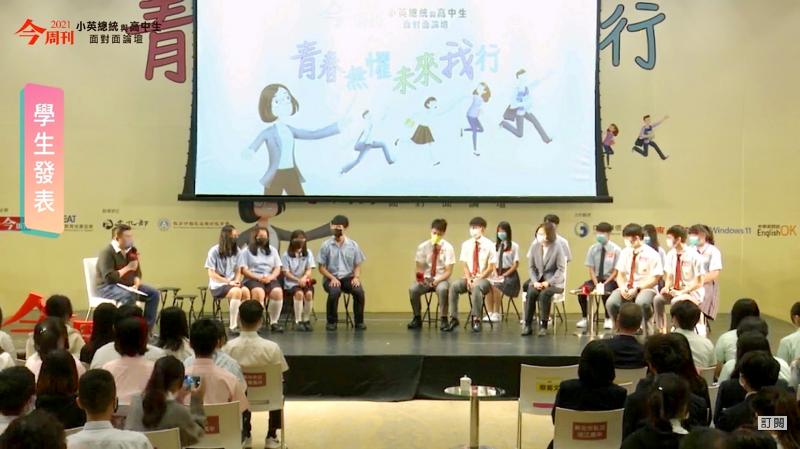President Tsai Ing-wen (蔡英文) on Saturday suggested replacing the English part of university entrance exams with proficiency tests, saying it would give students a better chance to test their English skills.
Tsai made the remark during an event in Taipei to exchange ideas with about 200 high-school students.
English proficiency tests meet societal and educational demands better than the English test that is part of the nation’s university entrance exam, she said.

Photo: Screen grab from a live stream
Should the English part of the exam be replaced with a widely accepted proficiency test, prospective students could take the test any time they like and focus on achieving a high score, she said.
Ministry of Education Department of Higher Education Deputy Director-General Chu Chun-chang (朱俊彰) said that the current Test of English Listening Comprehension for high-school students is offered on four levels and held twice a year.
The ministry would ask the Joint Board of College Recruitment Commission to discuss the feasibility of adopting English proficiency test results as a criterion for university entrance, he said.
National Sun Yat-sen University president Cheng Ying-yao (鄭英耀) agreed with Tsai’s suggestion, saying that the new policy would help students meet international standards when seeking higher education or finding jobs.
An Examination Yuan meeting earlier this year passed an amendment that added B1 level English proficiency tests as a criterion for level 1 Civil Service Senior Examinations, starting in 2024, in a bid to replace the exam’s English tests.

FALSE DOCUMENTS? Actor William Liao said he was ‘voluntarily cooperating’ with police after a suspect was accused of helping to produce false medical certificates Police yesterday questioned at least six entertainers amid allegations of evasion of compulsory military service, with Lee Chuan (李銓), a member of boy band Choc7 (超克7), and actor Daniel Chen (陳大天) among those summoned. The New Taipei City District Prosecutors’ Office in January launched an investigation into a group that was allegedly helping men dodge compulsory military service using falsified medical documents. Actor Darren Wang (王大陸) has been accused of being one of the group’s clients. As the investigation expanded, investigators at New Taipei City’s Yonghe Precinct said that other entertainers commissioned the group to obtain false documents. The main suspect, a man surnamed

DEMOGRAPHICS: Robotics is the most promising answer to looming labor woes, the long-term care system and national contingency response, an official said Taiwan is to launch a five-year plan to boost the robotics industry in a bid to address labor shortages stemming from a declining and aging population, the Executive Yuan said yesterday. The government approved the initiative, dubbed the Smart Robotics Industry Promotion Plan, via executive order, senior officials told a post-Cabinet meeting news conference in Taipei. Taiwan’s population decline would strain the economy and the nation’s ability to care for vulnerable and elderly people, said Peter Hong (洪樂文), who heads the National Science and Technology Council’s (NSTC) Department of Engineering and Technologies. Projections show that the proportion of Taiwanese 65 or older would

Democracies must remain united in the face of a shifting geopolitical landscape, former president Tsai Ing-wen (蔡英文) told the Copenhagen Democracy Summit on Tuesday, while emphasizing the importance of Taiwan’s security to the world. “Taiwan’s security is essential to regional stability and to defending democratic values amid mounting authoritarianism,” Tsai said at the annual forum in the Danish capital. Noting a “new geopolitical landscape” in which global trade and security face “uncertainty and unpredictability,” Tsai said that democracies must remain united and be more committed to building up resilience together in the face of challenges. Resilience “allows us to absorb shocks, adapt under

Taiwan Semiconductor Manufacturing Co (TSMC, 台積電) yesterday said it is building nine new advanced wafer manufacturing and packaging factories this year, accelerating its expansion amid strong demand for high-performance computing (HPC) and artificial intelligence (AI) applications. The chipmaker built on average five factories per year from 2021 to last year and three from 2017 to 2020, TSMC vice president of advanced technology and mask engineering T.S. Chang (張宗生) said at the company’s annual technology symposium in Hsinchu City. “We are quickening our pace even faster in 2025. We plan to build nine new factories, including eight wafer fabrication plants and one advanced